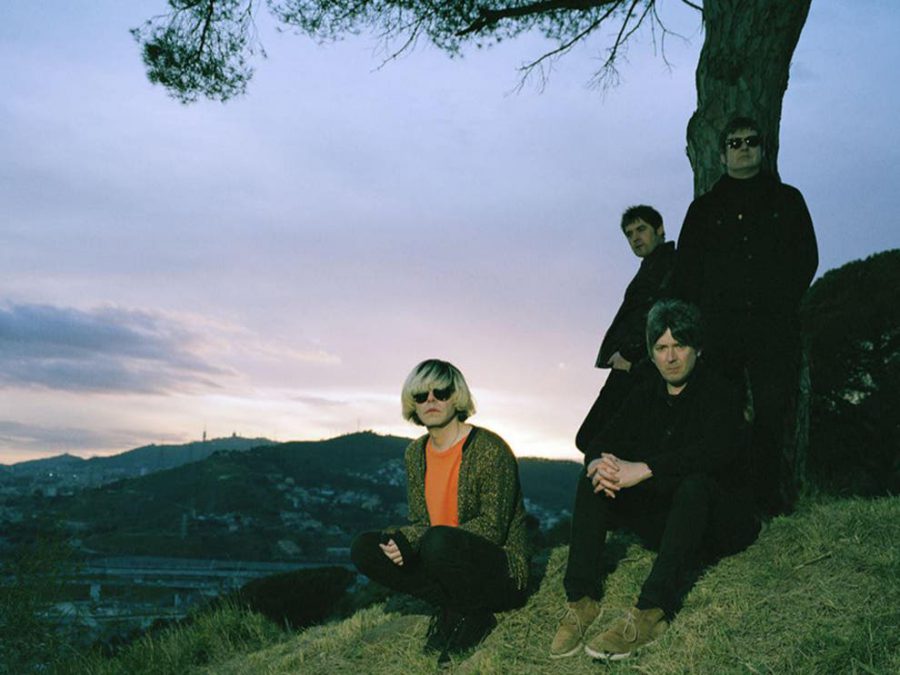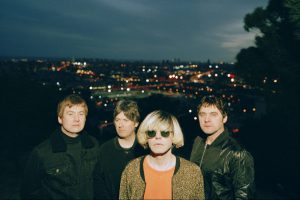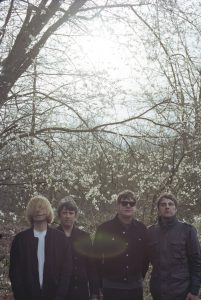Q&A: The Charlatans’ Tim Burgess on ‘Between 10th and 11th,’ tweeting with a Beatle

The Charlatans, courtesy.
In 1990, The Charlatans introduced themselves to the world with smash single “The Only One I Know.” Arriving within months of The Stone Roses’ “Fools Gold” and The Happy Mondays’ “Step On,” the song was so fully formed and perfectly timed with the peak of the U.K.’s “baggy” culture that it had all the hallmarks of a one-hit wonder.
The Charlatans UK, RIDE
8 p.m., Friday, Feb. 17
The Fillmore
Tickets: $105.50 (resale; after fees).
But no. The Charlatans were just getting started. Over the past 30 years, the band has endured both trends and tragedy, losing beloved founding keyboardist Rob Collins to a car crash and drummer Jon Brookes to brain cancer. They remain one of the last bands standing from both baggy and Brit-pop eras, frequently challenging themselves creatively to redefine their sound, seemingly too restless to bother with looking back.
Until now, that is. Next month the Charlatans kick off the “Between Nowhere” tour, where they will be playing fan-favorite sophomore album Between 10th and 11th, and sharing the stage with shoegaze legends RIDE, who will be playing their debut album, Nowhere.
“Charlatans and Ride played together in 1993, two shows. … It was a really exciting time,” Charlatans singer Tim Burgess said in a video call a couple weeks before the tour. “You’ve only had to wait for like 27 years, right?”
Burgess chatted about the band, the tour—he’s most excited to play songs like “I Don’t Wanna See The Sights,” “Ignition,” “The End of Everything,” “Chewing Gum Weekend” and “Page One”—and his pandemic lockdown Twitter experiment that has seen him working with up-and-comers like Iron Maiden and Paul McCartney.
RIFF: I was working in a record store when Charlatans’ 1990 debut, Some Friendly, came out and we used to play it all the time. It was like the scene in High Fidelity. I’d put on the CD and then we’d immediately sell like five copies.
Tim Burgess: It’s hard to explain that record because everyone seems to just really like it. And I always thought that was gonna be the way for everything.
It certainly captured a moment. But after that, the band explored vastly different sounds on subsequent albums. Were there moments when you’re in the midst of reinventing things where you wonder if the fans are gonna come along?
Tim Burgess: I think certainly with Wonderland. I certainly wanted to document [moving to] Los Angeles, and I wanted to document it by having The Charlatans make an album in Los Angeles. The first song that came was “A Man Needs To Be Told” and I really went for a kind of, like, Curtis-Mayfield-meets-Neil-Young-After-the-Gold-Rush falsetto voice. And then I did another one a bit like that, and all of a sudden it’s like I thought, “Yeah, the whole album should be like that.”
There’s kind of trepidation because you do it through instinct. You learn to trust it. And I think the instinct was right because people were shocked by it. But shocked in a way that it was a talking point and it was very listenable. To throw people like that, I think it’s very exciting. You’ve got to take those moments when you can. When I hear it, it’s like, “How did we make that music?”
How did you make Between 10th and 11th? You seemed to be constantly touring here in the U.S. for Some Friendly. Then you lose your guitar player at the end of all that and go straight into album no. 2. With Flood producing, of all people!
Tim Burgess: We had two songs, and we had about five unfinished ideas and a new guitar player. We went in with Flood, which was a blessing because he had just come off [U2’s] Achtung Baby and [Depeche Mode’s] Violator. Edge rang the studio to tell Flood that [Achtung Baby] was no. 1 in America. [Flood] pieced together a few things and helped us with arrangements. We had “Tremelo Song” and “I Don’t Wanna See the Sights” pretty well shaped up by the first week. “Page One” took a little longer, and “The End of Everything.” We ended up with songs that we were all really happy with, and then we had a record.
Songs like “Weirdo” and “I Can’t Even Be Bothered,” there’s a definite shift in tone. Darkness, some self doubt, maybe some sorrow. It’s produced brilliantly. I’m always surprised about how great it sounds. And if it’s not [Charlatans’] biggest record in America, it certainly had the biggest single in America with “Weirdo.”
It wasn’t what people thought the Manchester scene was supposed to sound like. The message wasn’t as positive. We were on the front cover of Rolling Stone with De La Soul with (Some Friendly). So Some Friendly reminds me of Three Feet High and Rising and Between 10th and 11th reminds me of De La Soul Is Dead.
When’s the last time you saw Ride? Have you caught any of their gigs since they got back together?
Tim Burgess: We played in Austin together at a festival so it was maybe like 2018 or something like that. Loz [Colbert, Ride’s drummer] is lovely and Andy [Bell, guitarist] is lovely and I’ve seen Mark [Gardner, guitarist] a little bit. I used to hang out with Andy in the ’90s and he’s not changed at all. I’m saving it all up for the tour and really enjoy the long catch-up.
What are your favorite Ride songs?
Tim Burgess: I really like “Mouse Trap.” I also also really liked “Birdman.” “Leave Them All Behind” is fantastic. I’m really big on [Ride’s second album] Going Blank Again. That’s my favorite.
Is there an album or era of The Charlatans that you look back on most fondly?
Tim Burgess: I’d say Modern Nature, because that was the last time that it felt really real. You know, we’d lost Jon, our drummer. We tried to make a record while he was alive. So it was heartbreaking. And when he died, we felt that he was still with us, hanging out with us in a dimension. That’s the way we felt it. He was with us, but he wasn’t. We made a record and it was easier because his five-year struggle with a brain tumor was over, but we knew he was with us. Everything that Jon had worked on, we had little bits and it just grew and grew and it was like a slow motion opening of a flower. It was just amazing.
During lockdown, you started “Tim’s Twitter Listening Party,” listening to various albums in real-time with the artists who made them and loads of music fans. It’s so healing to bring the act of listening to music back into the foreground rather than the passive experience that it has become. I just love the communal and participatory nature of it, and it’s still going strong.
Tim Burgess: I think people really needed it. Lockdown and COVID was very dark. It was the same time all over the world, and it was nighttime, and there was this listening party that everyone tuned into. Thousands of people were listening all over the world to a record all the way through with somebody who had a vital part in the making of the record.
Everyone seems to have responded incredibly well to it. There’s been a couple of books from it. Hopefully [it’s] gonna be a radio show. In between Charlatans records, [these have been] very much life-changing things.
You got to interact with a lot of old friends, but probably a lot of heroes who you’ve never met before.
Tim Burgess: Paul McCartney! I asked outright cheekily on Twitter and six weeks later, I got a Paul McCartney thumbs up emoji! It was full-on amazingness! We’ve had Barry Gibb, Talking Heads and our 1,000th Listening Party was Debbie [Harry] and Chris [Stein] from Blondie. Iron Maiden have had no. 1 albums, no. 1 singles, but never trended at no. 1 on Twitter, which they did within 45 seconds of the first track of Power Slave. Robert Smith, the other day, finished his gig in Amsterdam, 11 o’clock, [and then led a Listening Party for] Wish. Just brilliant. He typed everything in capital letters. …
It has evolved. We’ve got a lot of things in the pipeline coming up.
Follow Skott Bennett at Twitter.com/skottbennett.


